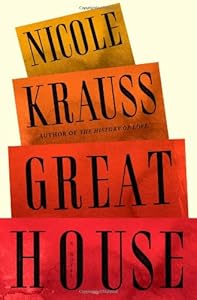 Cover of Great House: A Novel
Cover of Great House: A NovelWriting about Nicole Krauss' latest book - Great House - is difficult for me. I finished reading it less than three hours ago. I tried to think if I want to write a couple of lines about while writing other blog posts. Finally, after deciding which book will fill my next days - one by an author, David Grossman, whose style appears to me very similar with Krauss' in the investigation of the daily mystery - I will share a couple of non-literary and very personal fresh impressions about the book. Maybe I hurry up to start reading To the End of Land.
From many points of view, for me it is extremely difficult to find myself of voice of reviewing novels and, in general, literature. The ethereal idea of writing a review about poetry is almost frightening me. It took me almost one year to improve my style of reviewing scientific - predominantly from the area of political science and history - books. I always been a reader of literature, with minimum one good book per week, and love to talk about and with writers, but the review is coming out of the pen painfully. The main reason: I don't follow the literary canons and I am interested and mesmerized sometimes, about how it is used the power of words for revealing the untold words.
The book is made up of different stories, not all of them with an obvious end, but all of them are an effort to rearrange - and, by thus, to rewrite Jewish histories. In the old Jewish tradition, you don't learn by heart, but the customs and rules are repeated - and enriched and sometimes even changed - over and over again: by the rabbis, the wise men or by the family members. Each community is having its own tradition and each family its own history.
This continuity was disrupted by the Shoah, in our recent times. The destruction of the Temple of Jerusalem set the biggest picture of the Jewish narrative: "We live, each of us, to preserve our fragment, in a state of perpetual regret and longing for a place we only knew existed because we remember a keyhole, a tile, the way the threshold was worn under an open door". Because: "Maybe all exiles try to re-create the place they've lost out of their fear of dying in a strange place". This is the sense of the mystery of the writing desk, connecting histories, places, histories and people all over the world. All these are creating the illusion of living in a room with different kind of mirror walls - some reflections are real, some amplify exaggeratedly, some are misguiding and sending a wrong message.
The book is also a reflection about writing: why do you write - without directly expressing the question if you can't write literature and poetry after Shoah - how can you write and what do you need - and have to renounce, in terms of family life - for writing. In this case, the desk can be read as the structure of the writing brain, with its hidden and locked secrets whose key is in the pockets of your readers.
At the end, when I realize that plan of the book might be to draw back the Jewish history, with its heart beating at Jerusalem, I found that it is too ambitious. But maybe I was wrong.

No comments:
Post a Comment